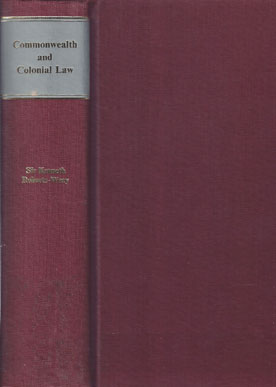
Out Of Print
....from the Foreword
No one is better fitted to write this book than Sir Kenneth Roberts-Wray. His long tenure as Legal Adviser of the Colonial Office has given him a unique knowledge of the laws of the countries of the Commonwealth, many of whom in his time became independent. But there are still nearly fifty separate territories administered under the authority of the United Kingdom, Australia and New Zealand.
As I read through all that he has so well written, I thought to myself time and time again: If only we had had this book 30, 40 or 50 years ago! How much labour and toil would have been saved. We should have been put immediately on the right track. But these are vain regrets. There was no Sir Kenneth Roberts-Wray to write it then, or at any rate no one who found the time: and he has only found time now since his retirement.
It would be a great mistake, however, to think that this book comes too late. Sir Kenneth discusses problems which are of vital concern to all countries of the Commonwealth. Not only to the small territories still reaching towards independence, but also the great independent countries too.
The basic law (to use Sir Kenneth’s phrase) of most countries of the Commonwealth is the general law of England. It includes the principles of common law and equity, statutes of general application, and the Crown prerogative. In this book you will find decisions from all countries showing how this basic law has been applied. Particularly a collection of cases on the “statutes of general application” which has never been done before. The new written Constitutions bear the same imprint. Most of them set out the fundamental human rights established by the common law of England.
The jurisdiction of the Judicial Committee does not extend so widely now as it once did. Many of the territories feel that an appeal to London is hardly consistent with their independence. They need not fear, Australia, New Zealand, Ceylon, Sierra Leone, Jamaica, Trinidad and Tobago and Malta still come to the Privy Council. Their Lordships advise the Heads of the Federation of Malaysia, Malawi and Gambia.
Here is a most valuable analysis of the Judicial Committee’s jurisdiction. Never before has there been collected cases showing the principles on which the Judicial Committee acts in criminal cases. Here, too, is an interesting discussion of the future of the Judicial Committee. Should it be reinforced by Judges from the Commonwealth? Should it travel round, as it were, on circuit? There are difficulties on which Sir Kenneth comments. But they should be overcome. The rival suggestion of a Supreme Court of the Commonwealth has not commanded general acceptance. We should reform the Judicial Committee to fit the conditions of today.
We all know that the independence of the Judges is one of the pillars of the Rule of Law. The accepted view is that in England Judges are not to be removed except for misconduct and then only on the petition of both Houses of Parliament. Sir Kenneth challenges this. He suggests that they can be removed for misconduct “by other means,” namely, by judicial process. It is noteworthy that this suggestion has been carried into some of the Constitutions of the newly independent territories, Often there is provision for an inquiry by a tribunal of judges. This is, no doubt, wise. It is quite the best way.
Lastly there is here in the first Appendix a most valuable synopsis dealing with all the territories of the Commonwealth, their history, constitution, judicature and basic law. Everyone who has dealings with the Commonwealth will find this a handbook to which he will turn continually. I know I will.
So at last we have the book to tell us all we need of the laws of the Commonwealth and Colonies. Sir Kenneth is to be thanked and congratulated.
DENNING.
The Right Hon. The Master of the Rolls, Lord Denning
January 27, 1966.